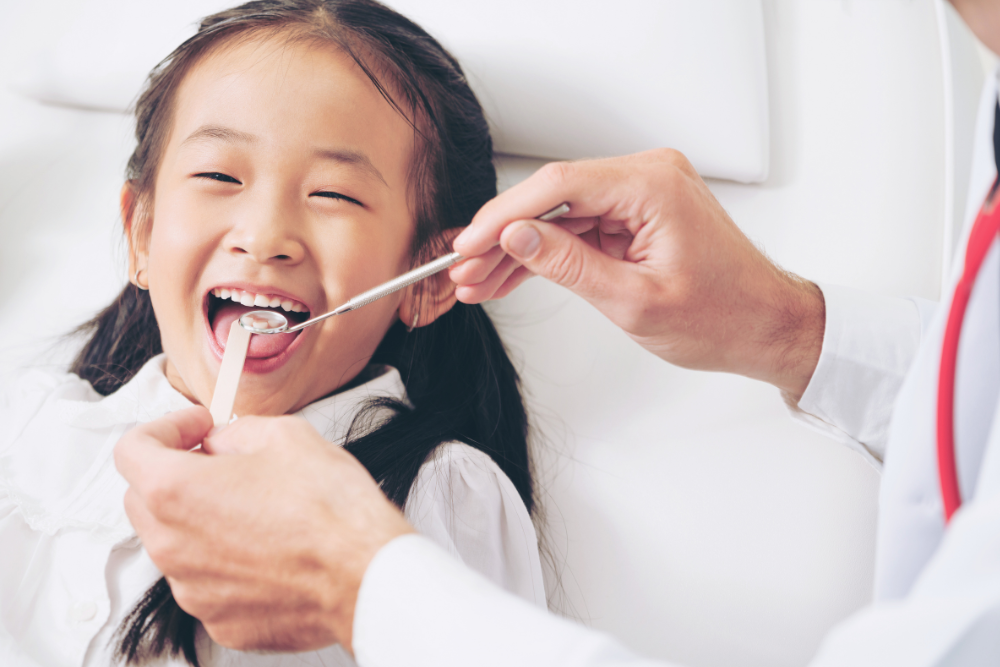As a parent, you are aware that your everyday actions may have an impact on your kid. And if you don’t put your dental health first, you and your kid may suffer.
Yes, Cavities are Contagious
The explanation could astonish you! Cavities are caused by sugar build-up in our mouths and a lack of excellent oral hygiene practices, as most of us are aware. While these elements have a role in the development of cavities, one unexpected explanation for their occurrence is that they are communicable.
Tooth decay is infectious, and multiple studies have proven that cavity-causing germs may be transferred from parents to children, according to the Los Angeles Times. As a result of your inability to brush and floss your teeth correctly, your kid may develop tooth decay, cavities, and other oral health issues.
Cavities are “contagious” because the bacterium that causes them, Streptococcus Mutans, may spread from one individual to another via saliva. This form of bacteria eats the sugar left in the mouth after drinking or eating anything, converting it to an acid that gradually erodes the hard enamel of the teeth.
You set the circumstances for plaque build-up when you don’t brush your teeth properly. Plaque comprises sugar, food particles, bacteria, and acids. Plaque may develop into tartar if youngsters do not brush and floss regularly. This potentially deadly mix of circumstances may lead to severe tooth decay and cavities!
While genes play a role in our teeth’s strength and health, germs carried from one person to the next will destroy the outer layers of your teeth, ultimately leading to serious cavities. Pay attention to the most prevalent causes of cavities.
So, What Should Parents Do?
- Make sure your mouth is healthy
It is not too late to start practicing excellent dental hygiene. Maintain a healthy diet, brush your teeth twice a day, floss once daily, and see the Childrens Dentist Indianapolis IN regularly. Say as many swear words as you like, but don’t forget to rinse your mouth! No, we may not live in the cleanest of surroundings, but that doesn’t imply we should just not endeavour to be clean! Brush and floss your child’s teeth regularly to show them how to care for them. You’ll not only lower the possibility of germs spreading, but you’ll also be a terrific role model for your children.
Remember that children learn by watching you, so pay attention to your oral hygiene practice. Join your children in cleaning their teeth properly and instructing them how to floss in the morning or before sleep.
- Reduce the amount of saliva-transferring actions you do
Sharing utensils and toothbrushes, for example. Blowing on your baby’s food is a bad idea. Cleaning your baby’s pacifier and pre-chewing your baby’s meal with your mouth.
In the home, families share a lot of things. Bathrooms, clothing, and food, to mention a few! But, particularly when it comes to your dining utensils, it may be time to halt or reduce that behaviour. Consider this: you wouldn’t share a toothbrush with your kid, so why would you share a fork? These objects may include germs from your mouth, which may be passed on to other family members.
Kids may develop a taste for mac n’ cheese, but the next time you take a meal with them, urge them to get their fork to prevent accidentally passing hazardous germs from your lips to theirs.
- Xylitol gum should be chewed by pregnant women and mothers
According to recent research, children of mothers who chewed Xylitol gum (beginning in the sixth month of pregnancy) had a considerably lower risk of microbial colonization.
- Pacifiers should be washed in the sink
If your child’s pacifier has been contaminated by banana or milk from a previous meal, rinse it under the faucet with water and soap. Many parents practise sucking on their child’s pacifier to clean it, but this is a big no-no. You could become ill not just from contaminating the pacifier with your germs but also from wherever your kid dropped their binky earlier!
- Keep an eye on what you eat and drink
We’ve previously spoken about ways to stop germs from being passed from one person to the next, but you need also think about prevention outside of your oral hygiene practice. Avoid sugary beverages like sodas, and if you’ve had teeth extracted and now have gaps between your teeth, limit your intake of fibrous foods.
Don’t allow the hazardous bacteria a chance to develop and reproduce in these conditions with plenty of food remnants. Avoid consuming unhealthy meals and beverages, and improve your tooth hygiene practice.
- Develop healthy dental habits
Brushing and flossing your teeth many times each day and using mouthwash regularly is an excellent dental practice for parents. If you start practicing excellent dental habits now, you’ll be able to pass them on to your kid and develop great dental habits in him or her for years to come.
Also, remember that excellent dental health starts at an early age. Brush your baby’s gums with water and a gentle toothbrush from birth to 12 months. You may also take your kid Children Dental Center Indianapolis IN for the first time when he or she turns one.
- Find out more about fluoride
Fluoride may impact kids’ teeth, so you should think about it if you want your child to have strong, durable teeth.
Kids Dentist Indianapolis IN advise giving a kid fluoride-free toothpaste before age two. Furthermore, you should speak with a Pediatric Dentist Indianapolis IN to learn more about fluoride and if it is a good choice for your child.
- Late-night snacks should be avoided
Allowing late-night hunger pains to get the better of you is a bad idea. Instead, aim to eat earlier in the day and avoid late-night munchies to avoid sugary foods that might harm your teeth.
Furthermore, provide healthful options regularly if your child desires a late-night snack or beverage. For example, giving your kid water instead of sugary juice may help to lower the risk of dental decay.
What’s the bottom line? Take care of your teeth and teach your children to appropriate oral hygiene practices rather than cavities.



